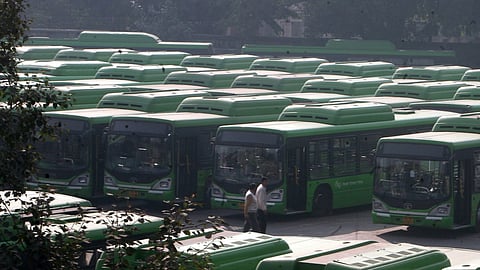

Delhi’s 2025 budgetary allocation for transport presents a transformative vision for the future of urban mobility. An unprecedented nearly Rs 13,000 crore is allocated for public transport, a 38% increase from the previous year and a giant leap in this direction. Prioritising the expansion of electric mobility, a comprehensive overhaul of public transit infrastructure, and the integration of digital reforms, this budget lays the foundation for a greener, more efficient transport ecosystem.
Leap Toward Sustainability
A central aspect of this budget is its strong push for green mobility. The plan to induct 5,000 electric buses into Delhi’s fleet is a step in the right direction towards decarbonising public transport. Importantly, the transport department had previously aimed to convert 80% of 11,000 buses (~8,800 buses)to electric by 2025, but so far, it has only achieved about 25% of this target.
There is now hope that the existing challenges can be overcome, making the way forward for Delhi’s transition to electric buses. With over 2,000 electric buses already in operation, Delhi currently ranks as the third largest fleet globally. With ambitious new procurements set to add around 3,000 more electric buses by 2026, this expansion can propel Delhi to the second place.
Their deployment will significantly reduce carbon emissions and harmful particulate matter. The budget also prioritises expanding the Delhi Metro, with nearly Rs 3,000 crore earmarked for Phase IV corridors—a significant increase from last year’s Rs 500-crore allocation. A well-developed metro system is the backbone of urban transit, reducing dependence on private vehicles and alleviating congestion.
However, bus and metro services must closely complement each other. With the induction of new buses and the expansion of metro infrastructure, a route rationalisation exercise of buses in partnership with Delhi Metro is imperative. This will strategically realign bus routes to complement metro corridors rather than compete with them, bridging critical gaps, strengthening feeder services, and enhancing last-mile connectivity. A well-integrated network will improve commuter convenience and maximise ridership across both systems, making public transport the most viable and seamless choice for Delhiites.
Digital Reforms
The 2025 transport budget also takes a bold step to modernise Delhi’s transit system by addressing long-standing operational inefficiencies with innovative digital reforms. A key element of this initiative is the rollout of a digital travel card for women, replacing the pink ticket system. This change is driven by the need to eliminate corruption and curb revenue leakage—a challenge highlighted by a CAG report revealing a staggering Rs 14,000 crore loss to the Delhi Transport Corporation.
Transitioning to a smart card system is a significant policy initiative that will help streamline fare collection by eliminating paper tickets and incorporating Aadhaar-based authentication to ensure that free travel benefits reach Delhi’s female citizens.
While rollout may have adoption challenges, this system will help curb revenue leakage and generate a valuable and rich dataset on travel behaviours, enabling transport authorities to analyse journey patterns, identify peak corridors, and pinpoint areas that need additional services or improved connectivity through route optimisation, adjustment of frequency schedules, and more effective resource deployment.
Ultimately, this data-driven approach will have the potential to make public transport in Delhi greener and more responsive to its users’ evolving needs.
Kratika Narain
Project Manager, The Energy Policy Institute at the University of Chicago (EPIC India)